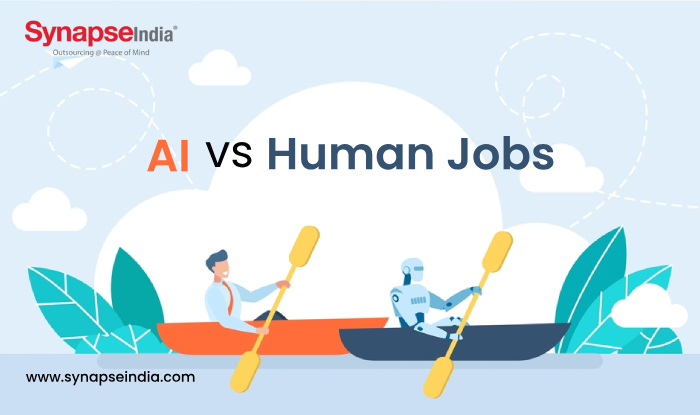 04 Jun 2024
04 Jun 2024“Discover how AI is transforming jobs and the essential skills needed to thrive in the AI era. Learn about digital literacy, critical thinking, and lifelong learning.”

In the present world, the integration of artificial intelligence (AI) is reshaping industries and redefining the nature of jobs. As AI technologies advance, concerns about automation and job displacement have become increasingly prominent. However, rather than viewing AI as a threat to human employment, it's essential to recognize the opportunities it presents and the skills required to thrive in this new era of work. In this blog, we will look at how AI has shaped the industries, especially its future and the work.

AI is revolutionizing various industries, from healthcare and finance to manufacturing and retail. Its ability to analyze vast amounts of data, automate repetitive tasks, and perform complex decision-making processes has led to increased efficiency, productivity, and innovation in many sectors.
One of the primary benefits of AI is its capacity to augment human capabilities rather than replace them entirely. By leveraging AI-powered tools and technologies, workers can streamline their workflows, make data-driven decisions, and focus on higher-value tasks that require creativity, critical thinking, and emotional intelligence.
While AI has the potential to create new job opportunities and enhance existing roles, it also raises concerns about job displacement and skill obsolescence. Routine tasks that are easily automatable, such as data entry, customer service, and manual labor, are at risk of being replaced by AI-driven solutions.
However, the widespread adoption of AI is expected to generate demand for new roles that require specialized skills in AI development, data science, cybersecurity, and digital transformation. Moreover, AI can empower workers to upskill and reskill themselves to adapt to changing job requirements and remain competitive in the labor market.
As AI continues to reshape the future of work, certain skills become increasingly valuable for individuals seeking to thrive in this digital age. Here are some essential skills for success in the AI era:
In an AI-driven world, proficiency in digital technologies and tools is essential. Workers should be comfortable using software applications, collaborating in virtual environments, and navigating digital platforms effectively.
With AI's reliance on data for training models and making predictions, understanding data fundamentals, such as data collection, analysis, interpretation, and visualization, is crucial. Workers should be able to extract insights from data and use them to inform decision-making processes.
While AI excels at processing information and performing tasks based on predefined rules, human judgment and critical thinking skills remain invaluable. Workers should be able to evaluate information critically, solve complex problems, and make sound decisions in ambiguous situations.
Creativity is a uniquely human trait that AI struggles to replicate. Workers who can generate innovative ideas, think outside the box, and devise creative solutions to challenges will be in high demand in the AI era.

The pace of technological change is accelerating, requiring workers to be adaptable and flexible in their approach to work. Those who can quickly learn new skills, embrace change, and pivot in response to evolving circumstances will thrive in dynamic environments.
Despite AI's capabilities in processing data and performing tasks, it lacks emotional intelligence—the ability to understand, express, and manage emotions effectively. Workers who possess empathy, communication skills, and interpersonal awareness will excel in roles that require human interaction and relationship building.
In the age of AI, the concept of lifelong learning has become increasingly important. Continuous learning and skills development are essential for individuals to remain relevant and resilient in the face of technological disruption.
Employers can support lifelong learning initiatives by providing access to training programs, professional development opportunities, and resources for upskilling and reskilling. Additionally, policymakers can invest in education and workforce development initiatives to equip individuals with the skills needed to succeed in the AI-driven economy.
As AI continues to reshape the future of work, it's essential to adopt a proactive approach to navigate the opportunities and challenges it presents. By embracing AI technologies, cultivating essential skills, and fostering a culture of lifelong learning, individuals can position themselves for success in the AI era. Ultimately, the future of work is not about man versus machine but rather about how humans and AI can collaborate synergistically to drive innovation, productivity, and prosperity.


